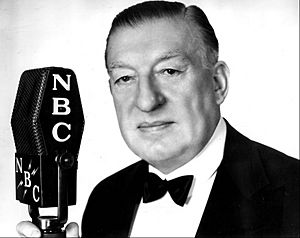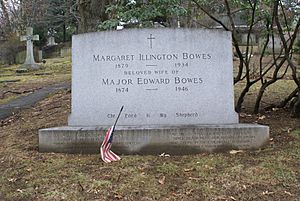Major Bowes facts for kids
Quick facts for kids
Edward Bowes
|
|
|---|---|

Major Bowes as his Amateur Hour became a national radio program in 1935
|
|
| Born | June 14, 1874 San Francisco, California, U.S |
| Died | June 13, 1946 (aged 71) Rumson, New Jersey, U.S |
| Pen name | Major Bowes |
| Occupation | Radio personality |
| Spouse | Margaret Illington (m.1910–1934; her death) |
Edward Bowes (born June 14, 1874 – died June 13, 1946) was a famous American radio host. Most people knew him as Major Edward Bowes. He was very popular in the 1930s and 1940s. His show, Major Bowes Amateur Hour, was the most famous talent show on radio for 18 years. It aired from 1935 to 1952 on NBC Radio and CBS Radio.
Contents
Edward Bowes: Early Life & Career
Edward Bowes' father died when Edward was only six years old. Young Edward worked hard to help his family earn money. After finishing grammar school, he worked as an office boy. Later, he started a business in real estate. However, the big 1906 San Francisco earthquake destroyed his wealth.
After this, he moved to New York City to find new chances. He soon discovered that the world of theater was a good place to make money. In New York, he worked as a musical conductor, composer, and arranger. He also produced shows on Broadway. He was married to actress Margaret Illington from 1910 until she passed away in 1934.
Becoming "Major Bowes"
Edward Bowes became the managing director of New York's Capitol Theatre. He ran the theater very strictly, almost like a military operation. He insisted that people call him "Major Bowes." This nickname came from his earlier military rank. Historians are not sure if he was an active officer in World War I or part of the Officer Reserve Corps.
The Famous Amateur Hour Radio Show
Major Bowes brought his most famous idea to the New York radio station WHN in 1934. He had actually hosted some amateur nights on smaller radio stations before this. These were when he was managing the Capitol Theatre.
Within a year of starting on WHN, his show became very popular. It was first called Major Bowes and His Capitol Family. Later, it became The Original Amateur Hour. This show earned Major Bowes a lot of money.
Discovering New Talent
The show's quick success made Major Bowes more famous than most of the performers he featured. Some of the people he discovered became big stars. These included opera singers Lily Pons, Robert Merrill, and Beverly Sills. Comedian Jack Carter and pop singer Teresa Brewer also got their start. Even Frank Sinatra appeared on the show in 1935 with his group, the Hoboken Four.
Show Highlights and Catchphrases
The Original Amateur Hour was always one of the top ten radio shows. Major Bowes had a famous saying: "Round and round she goes, and where she stops nobody knows." He would say this in his friendly, uncle-like voice. This was when he spun the "wheel of fortune" to choose the next performer.
In the early days, if a performer was not very good, Bowes would stop them by hitting a gong. However, many listeners did not like this. So, he stopped using the gong in 1936. Major Bowes was known for being a serious person who didn't talk too much. He tried to make contestants feel comfortable. He would often take them to dinner before they performed. He also featured more Black entertainers than many other shows at that time.
Major Bowes' Legacy
Major Bowes passed away just before his 72nd birthday. He died at his home in Rumson, New Jersey. The next week, his talent coordinator, Ted Mack, took over as host.
The show continued to be popular. In 1948, it started airing on television. Even after Bowes' death, it was called Major Bowes' Original Amateur Hour until 1950. Then it became Original Amateur Hour, and later Ted Mack and the Original Amateur Hour. Ted Mack hosted the show until 1970. The radio version of the show ran until 1952.
Major Bowes was mentioned in popular songs and movies. For example, he was in Cab Calloway's "I Love to Singa" from the movie The Singing Kid (1936). He was also in the song "Never Gonna Dance" from the film Swing Time (1936). The song I'm Still Here from the 1971 musical Follies also mentions him.
Charitable Contributions
Major Bowes was a generous supporter of the Catholic Church. He donated the land where Our Lady of Victory Church in Lower Manhattan was built. The auditorium at Archbishop Stepinac High School in White Plains is named in his honor. He also gave some rare books to St. Joseph's Seminary in Yonkers.
In 1939, Major Bowes donated his large estate in Ossining, New York, called "Laurel Hill," to the Lutheran Church. Today, it is still used as a retreat center for different church and community groups. It is known as the Major Edward Bowes Memorial Retreat.


